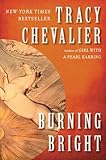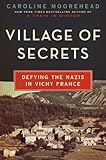 In 18th century England, Thomas Kellaway and his family decide to move to London to put behind some painful memories of losing their son and try to take advantage of an opportunity with the circus. Kellaway and his son Jem are carpenters, specializing in making chairs. They end up living next door to William Blake, a poet and engraver that sympathizes with the French. Jem makes friends with another girl his age, Maggie, who has lived in London her entire life and is the daugther of a wheeler and dealer who tries to sell anything to anyone.
In 18th century England, Thomas Kellaway and his family decide to move to London to put behind some painful memories of losing their son and try to take advantage of an opportunity with the circus. Kellaway and his son Jem are carpenters, specializing in making chairs. They end up living next door to William Blake, a poet and engraver that sympathizes with the French. Jem makes friends with another girl his age, Maggie, who has lived in London her entire life and is the daugther of a wheeler and dealer who tries to sell anything to anyone.
This book doesn't give an in-depth look at Blake's life, as he plays a secondary character, but we do learn a little of his poetry and perhaps of its origins. As far as character studies go from usual Chevalier books, I feel like we only skimmed the surface with Blake. I didn't really learn much about him aside from the fact that he engraved, he wrote poems, he was on the French's side, and he seemed to like children. More details would have been appreciated.
The lack of a strong theme was a big problem for this story. It didn't seem to be about much, which made it a slow and rather unsatisfying read. This is my least favourite book that I've read by Chevalier so far.
First Line: "There was something humiliating about waiting in a cart on a busy London street with all your possessions stacked around you, on show to the curious public."
Rating:




(3.5/5)
 Le Chambon-sur-Lignon is a small village in the mountains of France, known as place for summer vacations. During World War II, it served as much more than that. The locals helped hide Jews, resisters, and communists. Many were children that were integrated in to every day life so that non-locals wouldn't know who was supposed to be there and who wasn't. The villagers thought their actions were completely normal and wanted no recognition for what happened, which is why we are only hearing about this story now.
Le Chambon-sur-Lignon is a small village in the mountains of France, known as place for summer vacations. During World War II, it served as much more than that. The locals helped hide Jews, resisters, and communists. Many were children that were integrated in to every day life so that non-locals wouldn't know who was supposed to be there and who wasn't. The villagers thought their actions were completely normal and wanted no recognition for what happened, which is why we are only hearing about this story now.
 Inspector John Rebus is managing a few cases, harassment from television stations about a possible wrong conviction, and a personal interest in two serial killers. The cases start with a man that is impaled on a fence, tied to a chair, with a bag over his head. Did he jump or was he pushed? What circumstances caused the man to end here? The evidence takes him up north, looking at a crime boss Uncle Joe. He is known to run drug rings but no one can touch him.
Inspector John Rebus is managing a few cases, harassment from television stations about a possible wrong conviction, and a personal interest in two serial killers. The cases start with a man that is impaled on a fence, tied to a chair, with a bag over his head. Did he jump or was he pushed? What circumstances caused the man to end here? The evidence takes him up north, looking at a crime boss Uncle Joe. He is known to run drug rings but no one can touch him.
 FBI Agent Jessica Blackwood is called in to consult on an interesting case because of her background as a magician. The Warlock has hacked in to the FBI's website and left an encrypted message. It takes their computer scientists a week to uncover that the message contains GPS coordinates and, when they visit those coordinates, they find a dead girl, dead only a few hours. The problem is that this girl died 2 years ago. The FBI knows they are dealing with an illusionist and hope that Blackwood's experience can help them.
FBI Agent Jessica Blackwood is called in to consult on an interesting case because of her background as a magician. The Warlock has hacked in to the FBI's website and left an encrypted message. It takes their computer scientists a week to uncover that the message contains GPS coordinates and, when they visit those coordinates, they find a dead girl, dead only a few hours. The problem is that this girl died 2 years ago. The FBI knows they are dealing with an illusionist and hope that Blackwood's experience can help them.